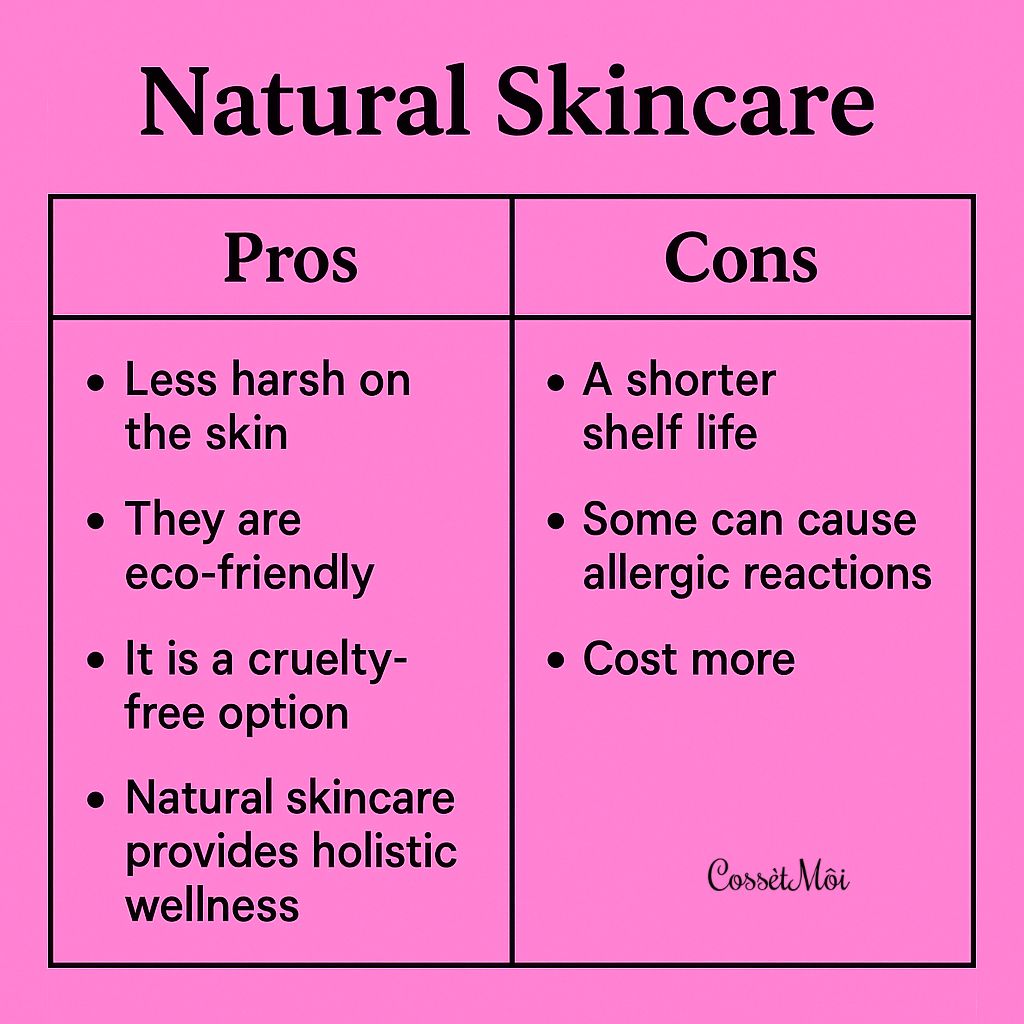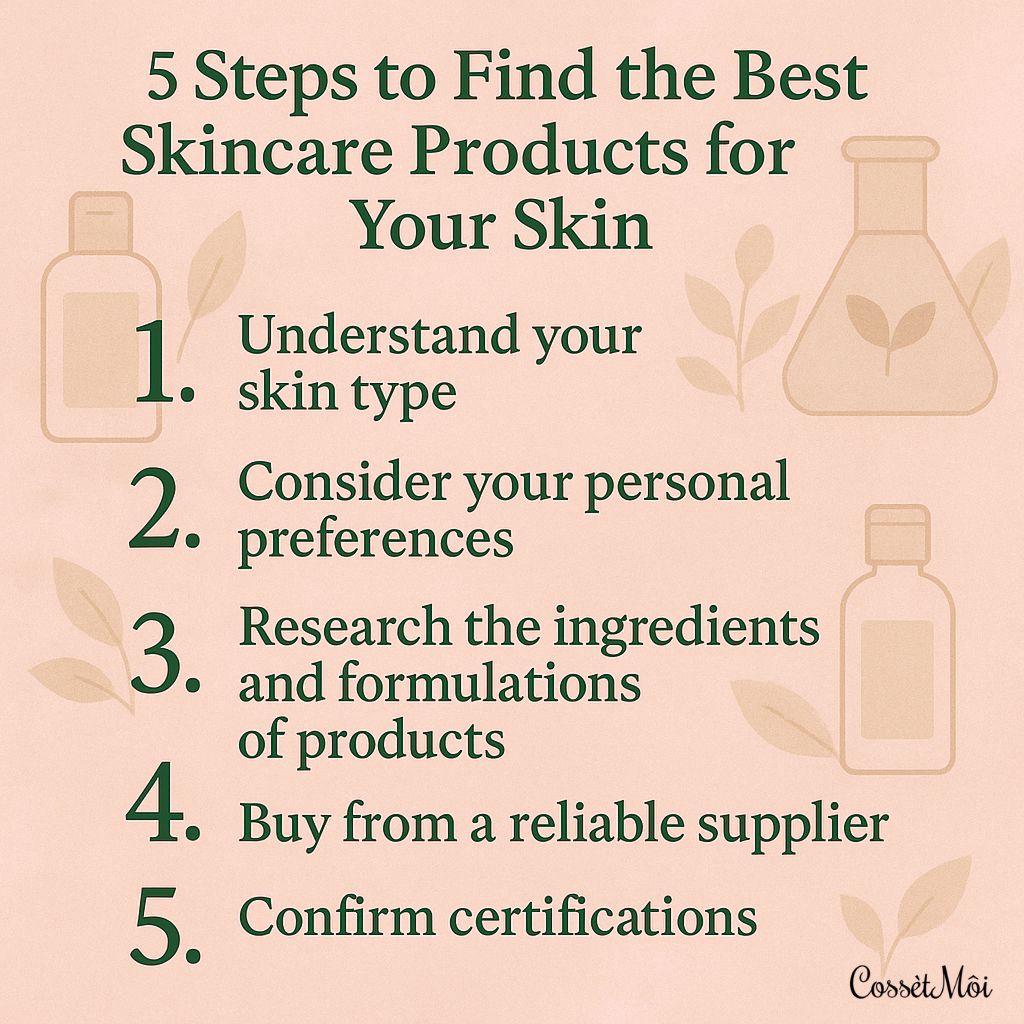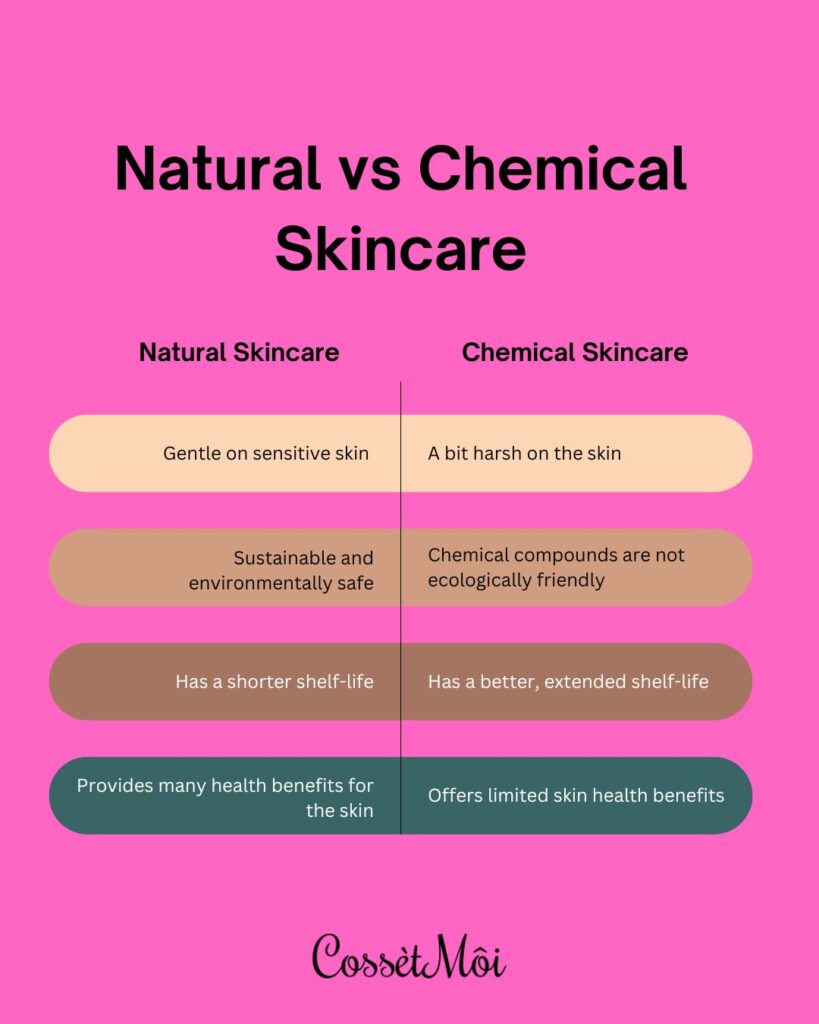Table of Contents
Picture this: In a 2024 research, 60% of shoppers cited skincare as their most-used product category. Surprisingly, people are increasingly investing in wellness products more than before. And the vast beauty market is flooded with products for every age and skin type.
But… there’s a problem: the ongoing natural vs chemical skincare debate is bringing confusion by the day. Natural skincare products are gaining popularity thanks to their safer, organic, plant-based, eco-friendly organic ingredients. Conversely, chemical/synthetic skincare regimens may contain harsh ingredients but have their good side, including instant results, affordability, and longer shelf life.
This begs the question: is natural skincare better than chemical? In this blog, we’ll cover everything about natural and chemical skincare and the pros and cons to consider when choosing a product.
Let’s dive in.
Natural vs Chemical Skincare: A Detailed Analysis
| Feature | Natural Skincare | Chemical skincare |
| Impact on Skin | Gentle on sensitive skin | A bit harsh on the skin |
| Sustainability | It is sustainable and environmentally safe | Chemical compounds are not ecologically friendly |
| Shelf-life | Has a shorter shelf-life | Has a better, extended shelf-life |
| Health Benefits | Provides many health benefits for the skin | Offers limited skin health benefits |
| Animal Testing | Products are cruelty-free | Some brands use animals for testing |
Both the natural and chemical skincare products have their benefits and limitations. That said, here’s the ultimate comparison of the two:
Natural skincare
Evidently, there’s a growing demand for clean beauty, with research showing that over 40% of shoppers prioritize natural ingredients in their personal care and beauty products. As the name suggests, natural skincare products include ingredients from natural sources and plants.
The NIH recommends essential oils and plant extracts, such as green tea and chamomile, for their skin hydration and therapeutic benefits.
Let’s explore the pros/Benefits of natural skincare below:

Natural skincare Pros
1. Less harsh on the skin
Natural skincare is made with chemical-free vitamins, minerals, plant extracts and oils. These ingredients make the products gentle and ideal for all skin types, especially sensitive ones. Using natural skincare reduces potential skin irritations and frustrating allergic reactions.
2. They are eco-friendly
If you love conserving the environment, natural skincare is your best choice. Such products are made from herbal extracts and are sustainable and non-toxic to the environment. Additionally, using bio-degradable and recyclable packaging significantly minimizes carbon footprints, ultimately conserving the environment.
3. It is a cruelty-free option
Did you know that a whopping 110 million animals die every year in the U.S. during drug or cosmetics testing? Most natural skincare do not include animal testing in the product development cycle to protect animals. Therefore, if you choose a cruelty-free product, you’re saving animals from harm or even death.
4. Natural skincare provides holistic wellness
When using products consisting of natural ingredients, you’ll get more than radiant, flawless skin. Natural skincare offers extra benefits essential for your skin’s healing. For instance, grape seed extracts, honey, coconut oil, aloe Vera, and turmeric are known for their anti-inflammatory, antioxidant, and moisturizing properties, enhancing overall skin health.
Cons of Natural Skincare
Despite all the benefits, natural skincare has various drawbacks. Some of the disadvantages include:
They take longer to show results.
1. A shorter shelf life
Natural skincare products are chemical-free and preservative-free. With the absence of additives to prevent microbial growth, pure plant-based ingredients shorten a product’s shelf life.
2. Some can cause allergic reactions
Overusing or misusing some natural ingredients in products can cause allergic reactions. Some plant extracts and essential oils may irritate over-sensitive skin types.
3. Cost More
Due to their careful formulation, natural skincare is likely to be more expensive than chemical ones. In one study, 87.1% of respondents found synthetic skincare cheaper than natural ones. The high cost of raw materials, use of safer preservatives, and organic certifications are some factors that make natural skincare costlier.
Chemical skincare
Synthetic skincare is also beneficial to your skin. It contains chemical compounds, including retinol, niacinamide, and hyaluronic acid, to provide specific advantages. While the chemical ingredients, preservatives and fragrances may irritate the skin, synthetic skincare products have various advantages.

Advantages of Chemical Skincare Products
1. Provide faster, instant results
Unlike their natural counterparts, chemical skincare consists of compounds that provide instant results. The products undergo extensive lab testing and include accurate measurements to quickly deliver specific, stable results.
2. Cost-effective
Synthetic skincare products’ raw materials and preservatives are easier to source and much cheaper. Further, it’s easier to do mass production for chemical skincare, improving accessibility. All these factors make them more cost-effective than natural skincare.
3. Lasting Effects
Synthetic ingredients can withstand degradation and are less prone to contamination. Additionally, Chemical skincare includes strong additives that extend its shelf life. While synthetic preservatives make products stable, the formulation process, usage, packaging, and storage conditions determine a product’s durability.
4. Target action
When it comes to chemical skincare, there are specific product formulations for different skin issues. For example, you can get an effective chemical product targeting wrinkles, one for facial marks and another for clearing acne. This target action helps you to resolve particular skin problems without spending much.
5. Allows better customization
Chemical skincare allows you to choose products that work best for your skin. Brands use research, consultations, questionnaires, and AI to customize a wide range of products, including moisturizers, cleansers, and lotions for specific needs.
Synthetic Skincare Cons
1. Harsh to the skin
Chemical skincare products contain parabens, sulfates, mineral oils, petrolatum, and phthalates that can cause skin irritations or allergies. This is terrible news if you have sensitive skin because overusing some synthetic ingredients may worsen skin sensitivity, potentially increasing allergic reactions in the future.
2. Environmental pollution
The majority of chemical skincare products include non-biodegradable compounds. These ingredients and non-recyclable packaging damage the environment extensively, especially during disposal.
Further, direct emissions from manufacturing processes increase the carbon footprints, causing damage to our ecosystem. Synthetic skincare harmful chemicals also pollute soil and water, leading to serious health concerns.
3. Long-term health risks
Like other chemicals, some compounds in synthetic skincare pose serious health issues, in the long run. For example, preservatives like paraben are linked to endocrine disruption while Polyethylene glycols could put you at risk of cancer.
How to Find the Best Skincare Product for Your Skin
If you’re still in a dilemma about natural skincare vs chemical, here’s what to do:

1. Understand your skin type
No matter your choice of skincare products, the effectiveness depends on your skin type. What works for dry skin may not sit well with oily skin.
Sensitive skin is delicate and acne-prone skin requires care. That said, ensure you get a product that works best for your skin type.
2. Consider your personal preferences
Ask yourself: what are your unique skincare needs? What do you love? Are you for smooth, radiant skin, or do you want generally healthier skin?
Weigh if you want a waterless, chemical-free option to include in your wellness routine or a product to quickly fix a specific skin issue. Look at your needs and preferences when choosing between natural vs chemical skincare.
3. Research the ingredients and formulations of products
Before buying any product, natural or synthetic, confirm whether it has science-backed ingredients. Researching ingredients ensures you use safe, sustainable, effective skincare products that match your needs. Some synthetic skincare products, such as Korean beauty products, include various safe ingredients that may be highly effective.
4. Buy from a reliable supplier
Reliable suppliers have the expertise and experience to guide you on the best product. Choose a trustworthy brand or seller for skin-specific, high-quality skincare products.
5. Confirm certifications
Check the label of a product to see if they have certifications. For instance, natural products often have organic certifications that guarantee quality. USDA classifies a product with 95% organic ingredients as ‘organic‘.
Verdict: Natural Vs. Chemical Skincare

Natural skincare is safer, chemical-free, eco-friendly, sustainable, cruelty-free, and poses minimal side effects. It also has anti-inflammatory and antioxidant properties that enhance overall skin health.
On the other hand, chemical skincare is affordable, fast-acting, customizable, and best for targeting specific skin issues. Notably, both options have their benefits and drawbacks.
So, is natural skincare better than chemical? Explore this blog to learn the pros and cons of natural and chemical skincare products to help you decide your best choice.

